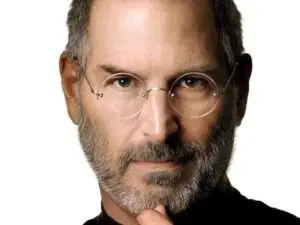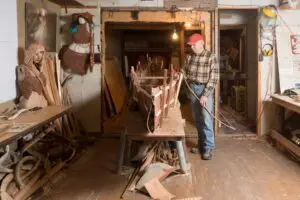Saying NO to Growth in Banff
What do People in Banff & Steve Jobs have to tell us why we must say NO to the Growth that is killing us

I recently spent a week and Banff and Canmore. After chatting with several people about the problems that growth has brought to the region. It made me think of an idea from Steve Jobs who is [in]famous as both a creative genius and brutal and temperate managers who steered Apple to global dominance. His business acumen is well known but it is really his artistic flair and appreciation for beauty that was integrated into the technology his engineers developed that set him apart. I think he has a bit to teach us on how we win “the war” we now have with ourselves – a “war” that is destroying Life on Earth, ideas very similar to the military strategist von Clausewitz.
The talent of the strategist is to identify the decisive point and to concentrate everything on it, removing forces from secondary fronts and ignoring lesser objectives. – Carl von Clausewitz
Although it is an uncomfortable fact, in many ways life is war. That also means avoiding war whenever you can because in a war you lose control of the situation and the unexpected is the norm. However by this I am not supporting the theory of the survival of the fittest and competition but rather focusing the more powerful part of life – cooperation and working with others who work on a common cause for mutual benefit. Within this perspective is a subtly that Steve Jobs of Apple fame and a German military theorist von Clausewitz both understand this: you have to know your limits and then focus your limited resources as the one thing that really matters to win the war called life. That includes avoiding situations where you are bound to be overwhelmed by forces beyond your control – which is exactly like a exponentially growing economy is – a beast out of control. War is a helpful metaphor because in a war if you make a mistake your lose and you die. In “normal” life it is similar – the feedback is just not so clear or immediate. Given that any organization or person has limited resources you must focus them on the most important areas and stop spreading them out so wide that you actually get nothing done well and fail to achieve the one or two goals that actually matter. Now to do this I emphasize that cooperation is actually the most important principal underlying competition: people must trust each other and believe in a common goal and have allies and friends to allow the conflicts that are normal in life to not get out of control. What I am also saying is that we should be more like the Swiss who avoid war by perpetually being ready for it and being well armed. Anyway, this line of thought is beyond the scope of this little exploration so let’s just stick to the Power of No and rather than take my word for it on this topic you can this listen to this recording of Steve Jobs explaining this idea to his engineers: https://www.youtube.com/watch?v=JbEjAFrvJv0

Focusing (and thus accomplishing your goal) is all about saying NO. – Steve Jobs
At the moment I am not working for Apple or in a place of war but I am in Banff where there is a type of war going on: the war to preserve the integrity of the beauty and wildness of the corner of Canada. The problem is simple: too many people come here for the town or park to handle. At a local museum I just visited I read and listened to these comments by long time locals. The first, Clifford White who started the large ski hill development Sunshine and a ski industry mogul, said this in the book “Mountain Romantics” by Chic Scott:
The later developments at Sunshine were a response to demands created by the earlier developments. There was no turning back; the resort owners got into a cycle they couldn’t stop. Growth begets growth. Clifford later said: “If I had to do it all over again there would be not be any ski areas in a national park.”
The second, Don Gardner is a craftsman who lives in Canmore who builds birch bark canoes. He is more poetic as he tries to explain why we must be careful to not allow technology to separate us from the planet and each other – another example of limits and saying no.
Human ingenuity has continually driven people to develop new technology. Even a birch bark canoe, to build it and carve it with flint as they once did, was high tech in its day. Within the context right now, high end technology is computers and communication. Now we “see” people communicating but not truly talking with each other. I am not a philosopher so I worry a about where this is leading our species as we become adapted to electronics and speed. You know this type of life misses the nuance and connection that is what life is really about so that deep down in our emotions are thrown out of balance by all this new zap, zap, zap. It makes me think we are losing the most important things that are essential to our survival as a species. This is hard to communicate because its an emotional thing that makes us feel a certain way in society, a belonging to each other and belonging to the planet. Its a totally different technology today than that of a birch bark canoe which connects you to the planet instead of separating you like modern technology does. When you stop making things like birch bark canoes, when you stop knowing anything about the dirt, the wind, the birds, you stop having this deep emotional connection to the planet. These are the connections we must foster if we are to survive.

The third person I met was a store owner who obviously had time on her hands, which was odd because the streets were packed with people. I asked how business was and she said that in spite of the crowds business was down significantly because people were not going into the shops to spend money, which I had already heard from other shop owners. She kept chatting and eventually said this “shocking” statement: “We need to close down the borders to immigration until we can get our own house in order and provide decent and affordable housing for people with jobs that pay enough to pay the bills.” Shocking, but her insight into the fact that growth is now hurting rather then helping the average Canadian, is certainly spot on. I imagine that there are many who feel as she does but are unwilling to say so publicly for fear of being called a bigot.
So how can these insights from Steve Jobs, von Clausewitz and the folks in Banff help us deal with the collapse and overshoot that we are now living through? I think they tell us that we must focus on energies on what counts. I think it is clear that until we must change our attitude to growth and see it as a double edged sword that is helpful at some phases in the life of a society but that is not now – now is the time to switch gears and live within the planetary limits given to us. Sadly, it is clear that our socio-economic behaviour is not going to change without more disasters like the Jasper fire and they will keep on becoming more and more common until we stop growing. At the end of the day life is simple for all living beings – change and adapt to new ecological realities or perish. That message was reinforced by our visit to the excellent Drumheller Dinosaur Museum in Alberta which had a section on evolution and the mass extinctions which are a fundamental part of the evolution of life on Earth. Extinction is normal. Mass extinctions also happen on a regular basis every few hundred million years. And yet, some species, like turtles and sharks and ferns and cynobacteria survive. How do they do it? What can we learn from them? I am guessing, and this is only a guess as I am not an evolutionary biologist, that they live within their limits and are flexible enough to adapt to new environmental conditions. My hope that we can learn to do the same.
So what are we to do? Adopt the principle of WEI-WU-WIE – the conscious non-action, the deliberate and principled decision to do nothing for a good reason. That means degrowth. That means saying NO to more. No to more stuff. Even no to more people. No to Growth and instead focusing all our energies are finding a way for humans to find technologies that allow to live as part of the Ecosystem that we belong to. Or else….

T.Rex skull
“Have the courage to follow your heart and your intuition,” he said. “They somehow already know what you truly want to become. Everything else is secondary.” – Steve Jobs
References
https://warroom.armywarcollege.edu/articles/grand-strategy-clausewitz/
https://www.theschooloflife.com/article/wu-wei-doing-nothing/
video on making a birch bark canoe https://www.youtube.com/watch?v=QFFN8gNlZX0
Appendix – Wu wei
Wu wei means – in Chinese – non-doing or ‘doing nothing’. It sounds like a pleasant invitation to relax or worse, fall into laziness or apathy. Yet this concept is key to the noblest kind of action according to the philosophy of Daoism – and is at the heart of what it means to follow Dao or The Way. According to the central text of Daoism, the Dao De Jing: ‘The Way never acts yet nothing is left undone’. This is the paradox of wu wei. It doesn’t mean not acting, it means ‘effortless action’ or ‘actionless action’. It means being at peace while engaged in the most frenetic tasks so that one can carry these out with maximum skill and efficiency. Something of the meaning of wu wei is captured when we talk of being ‘in the zone’ – at one with what we are doing, in a state of profound concentration and flow. The principle affirms that one should live spontaneously in accordance with the natural flow of the cosmos called the Dao, and not act against this natural order and rhythm of nature. According to Daoism, human happiness occurs when one aligns with the Dao, and Wu-wei allows practitioners of Daoism to live in harmony with one’s natural surroundings and to be mindful of the interconnectedness of all life.
Leave a Reply